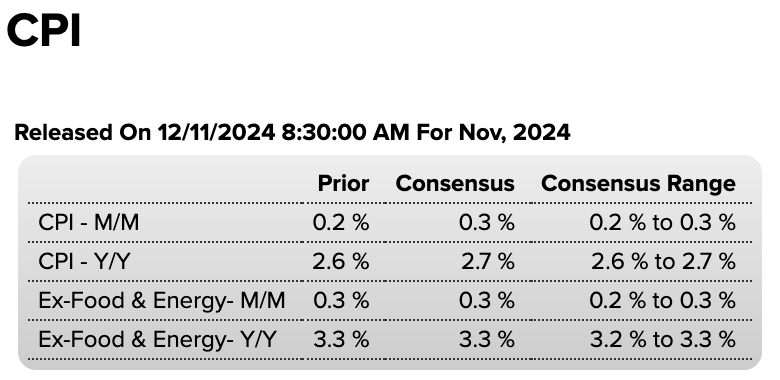Rise and shine everyone.
Markets remain focused on the US CPI data release today. The Truflation U.S. Inflation Index rose to 2.93% overnight, the highest since October 2023, compared to the government-reported rate of 2.6%. The Cleveland Fed’s Inflation Nowcast predicts November U.S. CPI will accelerate to 2.7% year-on-year, with further increases expected for December. Fed Governor Waller recently warned of inflation stalling above the 2% target.

In Japan, November PPI reached its highest year-on-year level since June 2023, while large industry and manufacturing trends continued improving in Q4. The yen recovered slightly against the dollar as 10-year JGB yields edged up 1 basis point. Analysts are split on whether the Bank of Japan will raise rates in December or delay until January.
Meanwhile, China bond yields remain under pressure after signaling looser monetary and fiscal policies for 2025, with the 10-year yield dipping below 1.89%. China Securities Journal highlighted expectations for “bigger” rate cuts next year but issued a caution about the risks of a bond rally correction.
South Korea continues to grapple with political instability following President Yoon’s failed martial law attempt. The opposition has vowed to pursue weekly impeachment votes, while some ruling-party members are reportedly planning for Yoon’s exit by February or March next year.
Commodity currencies remain under pressure, with the Kiwi dollar hitting a 26-month low and the Australian dollar also weakening.

Oil prices saw marginal gains amid reports the U.S. government may impose tougher sanctions on Russia’s oil trade ahead of Donald Trump’s inauguration, potentially targeting shadow tanker fleets. China’s Central Economic Work Conference begins today, focusing on the country’s economic policy outlook for 2025.
And finally, the Biden administration plans to impose new tariffs on imports of critical materials from China, effective January 1. These include doubling the tariff on Chinese solar wafers and polysilicon to 50% and introducing a 25% levy on tungsten products. China, the world’s largest tungsten exporter, uses this material extensively in industrial tools, aerospace components, and chip manufacturing. Solar wafers and polysilicon are vital for solar cell production, highlighting the strategic focus of these measures.

Chart of the Day
The NFIB Small Business Optimism Index rose by eight points in November to 101.7, after 34 months of remaining below the 50-year average of 98. This is the highest reading since June 2021.
“The election results signal a major shift in economic policy, leading to a surge in optimism among small business owners. Main Street also became more certain about future business conditions following the election, breaking a nearly three-year streak of record high uncertainty. Owners are particularly hopeful for tax and regulation policies that favor strong economic growth as well as relief from inflationary pressures. In addition, small business owners are eager to expand their operations.”

Calendars
(news taken from Reuters, FT, Bloomberg; Calendar from Trading Economics)


